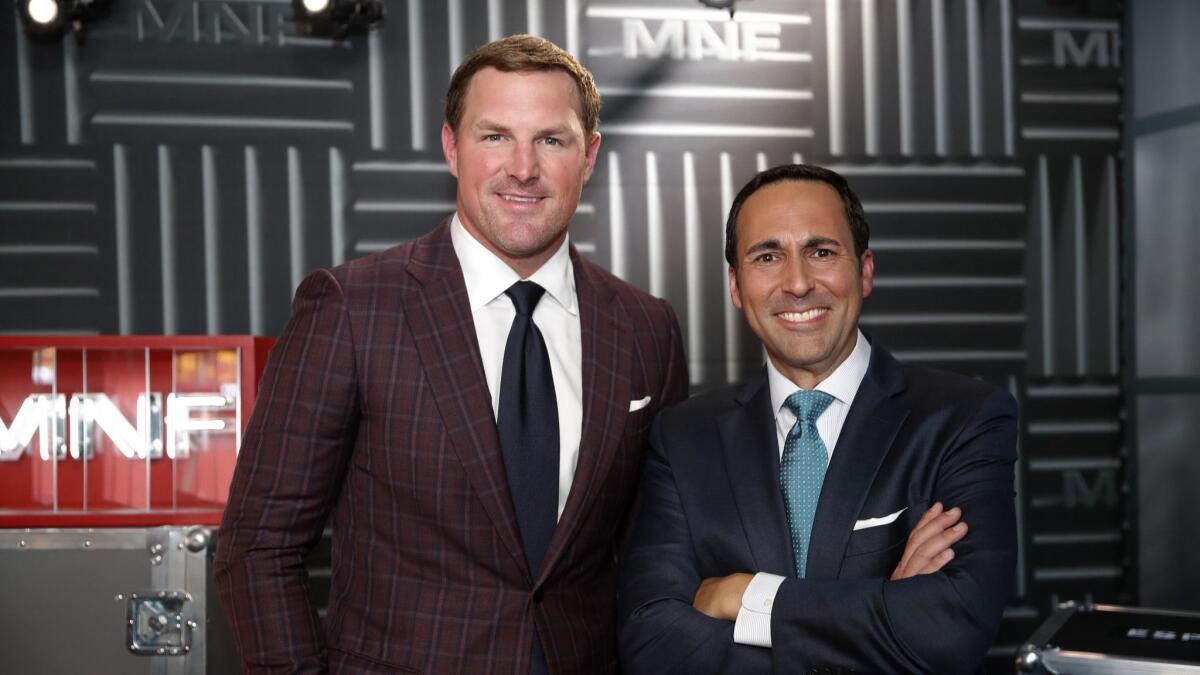Despite becoming a joke to the internet after his first broadcast, Jason Witten hopes to join the Cowboy greats who excel in the booth

- Share via
How ’bout them Cowboys?
They’re everywhere, former Dallas Cowboys players who now populate broadcasting booths across a spectrum of channels.
From Troy Aikman at Fox to Tony Romo at CBS to Jason Witten at ESPN, three of the four network “A-teams” feature an analyst who spent his entire NFL career with a star on his helmet. The lone exception is NBC’s Cris Collinsworth, a former Cincinnati Bengals receiver.
“They are in the brightest of spotlights [as players], everybody is following every move that those guys are making,” Collinsworth said. “They’re pretty sophisticated media-type guys when they’re coming out of there. It’s a high-energy place, and a high-energy owner who’s not afraid to speak his mind, so I think it makes the players a little more forthright.
“There’s an art to not saying too much, but saying enough to where you’re still interesting. Some players do that really well, and it turns into a career for them.”
Toss in Jimmy Johnson, Daryl Johnston, Michael Irvin, Deion Sanders and a host of others dating to Don Meredith, an original member of the “Monday Night Football” booth, and the airwaves take on hues of blue, silver and white.
Said Brad Sham, longtime play-by-play man on the Dallas Cowboys Radio Network: “You cannot scare Tony Romo or Jason Witten or Troy Aikman with the national visibility they get when they played for the Cowboys for 10 years. They’re used to stuff happening.”
Fox’s Johnston, who won three Super Bowl rings in 11 seasons as a Cowboys fullback, said that answering questions in massive media scrums was ideal for players headed for TV careers.
“Being able to answer questions post-game, especially after a loss, and being able to do it in an intelligent, succinct manner was kind of like on-the-job training,” he said.
“Everybody laughed because at one time, toward the end of our Super Bowl run, even our long snapper had his own TV show. There was no short supply on opportunity.”
What’s more, once they were finished with their football careers, the ex-Cowboys were ready-made stars.
“There is an exposure certainly to all of us that were part of the organization,” Aikman said. “And then I think there’s a familiarity that comes with that. With us winning the way we were able to win, Irvin was a household name, Deion — who didn’t spend his entire career with the Cowboys — he was a household name. I was as well. That’s probably somewhat encouraging to these executives, to hire somebody that doesn’t have to be introduced to the public.
“But I think it’s a bit of an over-reach to say that because of the attention to the Cowboys by the media it prepares us to move into broadcasting more than some of these other big-market players.”
Not everyone is a natural. Whereas Romo got rave reviews for his prescient pre-snap observations, Witten wasn’t as polished when he made his “Monday Night Football” debut. A go-to guy for the media during his 15 seasons, Witten was picked apart on Twitter for everything from his intermittent eye contact with the camera to the snug fit of his dress shirt to occasionally holding the microphone too high. Tough crowd.
Cowboys great Roger Staubach had a brief and unspectacular flirtation with TV, then went on to make a fortune in real estate. Broadcasting wasn’t Emmitt Smith’s strong suit, either. Still, both have had significant successes in their post-football lives.
Johnson, who coached the franchise to two Super Bowl victories, recalls a time when the Cowboys weren’t so TV savvy.
Long before he became a fixture on “Fox NFL Sunday,” Johnson had some good TV gigs. He was part of a weekly coaches show when he was defensive coordinator at Arkansas in the early 1970s and later oversaw the ad sales and production of a University of Miami football show that he said garnered him close to $400,000 a year.
So when he got to the Cowboys in 1989 and saw that their local TV deal netted them a scant $10,000 a year, he couldn’t believe it. He and Cowboys owner Jerry Jones called a meeting with the Dallas station that aired the team’s weekly show.
“I pulled out the books and said, `Guys, really, something’s afoul here because I’ve been doing TV for quite some time, and this shows the Dallas Cowboys at $10,000?’” Johnson recalled. “They didn’t even answer. They stood up and said, `Evidently, you don’t want to do a first-class show.’ And they walked out.
“Jerry looked at me and said, `Well, you’re so smart, what are we going to do for a TV show now?’”
Johnson brought in his producer from Miami, “and we doubled in our first year what I had made in Miami.”
As for the local station executives that walked out on that meeting?
“They got their hands caught in the cookie jar,” Johnson said. “They were making a ton of money off the Dallas Cowboys, and nobody called them on it. I don’t know if they were mad or embarrassed or what, but they knew they had to have a relationship with us, so we never had any negative feedback.
“They needed us more than we needed them.”
Follow Sam Farmer on Twitter @LATimesfarmer
More to Read
Go beyond the scoreboard
Get the latest on L.A.'s teams in the daily Sports Report newsletter.
You may occasionally receive promotional content from the Los Angeles Times.











